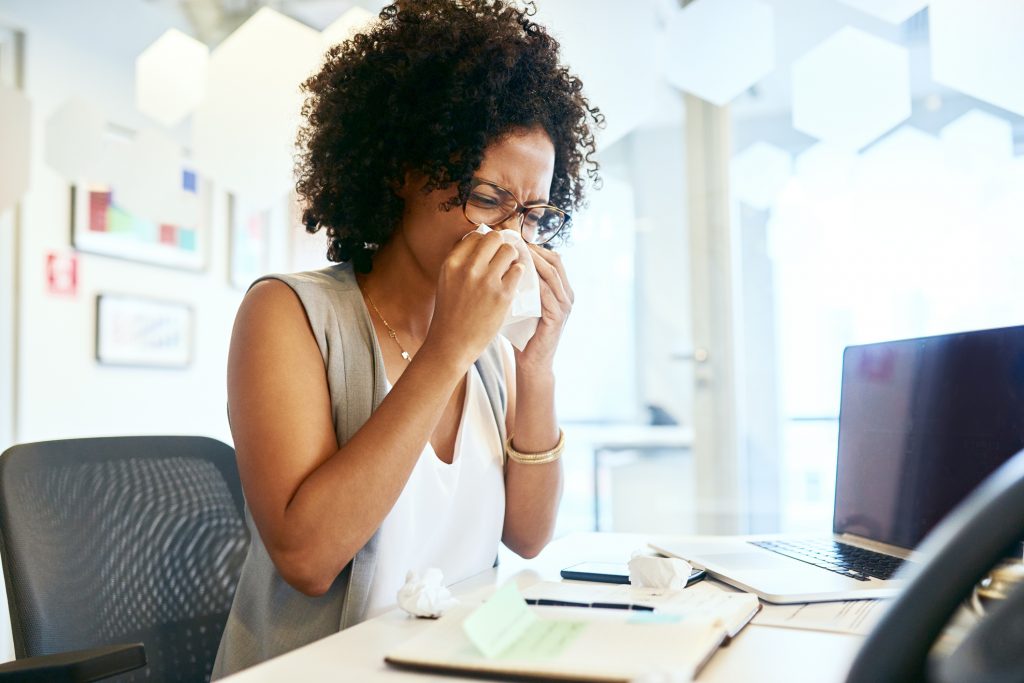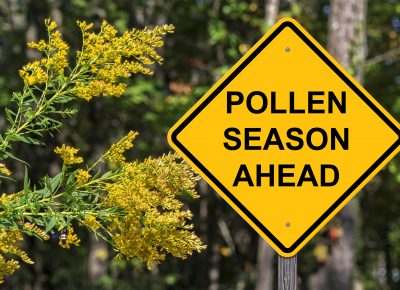Spring allergy season is already here due to warmer weather. Seasonal allergies affect many people each year. Learn more about what you can do to help prevent and treat your seasonal allergies this year.
When does Spring allergy season begin?
Spring allergies usually can begin in late February and continue into June for some people.
Seasonal allergies develop when your body’s immune system overreacts to a trigger in the environment (pollen, ragweed, trees, grass, mold, etc.) usually during the spring, summer, or fall when the plants are pollinating.
What can bring about Spring allergy symptoms?
Spring allergy symptoms vary from individual to individual and also are based on the climate in a geographic region.
Here are some things that affect the timing and severity of allergy triggers:
- Tree, grass, and ragweed pollens that thrive during cool nights and warm days.
- Molds can grow quickly in the heat and high humidity.
- Pollen levels tend to peak in the morning hours.
- Rain washes pollen away, but pollen counts can soar after rainfall.
- On a day with no wind, airborne allergens are grounded.
- When the day is windy and warm, pollen counts surge.
 What are typical allergy symptoms?
What are typical allergy symptoms?
- Sneezing
- Runny or stuffy nose
- Watery and itchy eyes
- Scratchy throat or a “tickle” in your throat
- Ear congestion
- Postnasal drip
Less common symptoms of allergies include headaches, shortness of breath, wheezing, coughing. If these symptoms are present this may indicate possible other causes and would warrant further evaluation and possible treatment by a healthcare professional.
What can be done to help allergy symptoms?
- Monitor pollen and mold. This can be found on the local news stations’ weather reports, in newspapers, and on some weather apps on your mobile device or phone.
- Keep windows and doors shut at home and in your car during allergy season.
- To avoid pollen, know which pollens you are sensitive to and then check pollen counts. In spring and summer, during tree and grass pollen season, levels are highest in the evening. In late summer and early fall, during ragweed pollen season, levels are highest in the morning.
- Take a shower, wash your hair, and change your clothes after you have been working or playing outdoors.
- Over-the-counter allergy medications like Claritin, Zyrtec, Allegra, and Xyzal can be taken daily for relief of symptoms. Some nasal sprays like Flonase can help more moderate symptoms of allergies. In severe cases, you may need prescription medications from your healthcare professional.
- Oral decongestants such as pseudoephedrine (Sudafed) can provide short-term relief from nasal stuffiness. Decongestants also come in nasal sprays, such as oxymetazoline (Afrin) and phenylephrine (Neo-Synephrine). Only use nasal sprays for a few days in a row. Longer-term use of decongestant nasal sprays can worsen symptoms (rebound congestion).
When should you schedule an appointment at Everest Urgent Care for allergy symptoms?
If you have ever experienced allergy symptoms, such as runny nose, itchy eyes, red or watery eyes or scratchy throat, it is best to get tested for allergies to determine what is causing the symptoms. Testing allows you to gain a better understanding of what you are allergic to and what triggers your symptoms. You can get tested for allergies throughout the year, but it is recommended to get tested in the winter months. This is because it allows us to determine what allergies you have ahead of time so that we can manage and combat symptoms during the upcoming spring/summer months.
What can I expect from an appointment for my Spring allergy symptoms at Everest Urgent Care?
Knowledge is the key to your good health. The more you know, the better you can take care of yourself. When you come in for your first allergy appointment visit, you can expect us to obtain a full history of your symptoms, when they started and what triggers of which you may think. If you come in with active allergy symptoms, you can expect to get symptomatic treatment. This means that you will be prescribed an antihistamine, nasal spray, eye drop and/or steroids, again depending on your symptoms. We will also perform allergy blood testing during your first visit.
There are two types of allergy panels, respiratory and food. A respiratory panel is used to determine seasonal allergies, testing for pollen, oak, grass and much more. It takes about 7-10 days to receive the results. We will review these with you over the phone or in person. This information will give you the knowledge to avoid the triggers, which in turn helps manage your symptoms.
Patients can be expected to be treated for their allergy symptoms. This includes learning about the different triggers of allergies and how to prevent or avoid them and they will receive treatment options to try to help alleviate their allergy symptoms.
Everest Urgent Care Offers Care in Upper Darby and Chester, PA
Everest Urgent Care offers extended hours, seven days a week at two convenient locations in Upper Darby and Chester, PA. For added convenience there is an on-site lab and x-ray. Our doctors and nurse practitioners have extensive primary care and urgent care experience. They understand your health needs and focus your care not just on treatment but also on education and prevention. They recently welcomed Rajbinder Randhawa MSN, CRNP, FNP-BC and Kaleb F. Carter, RN, FNP to the Medical Staff.

